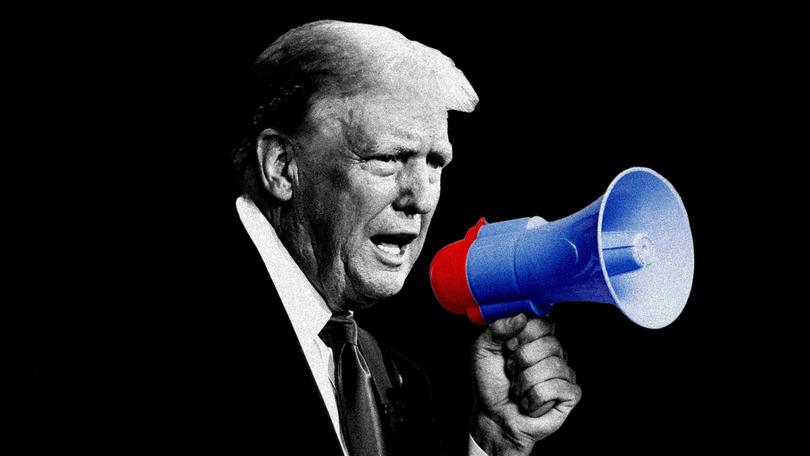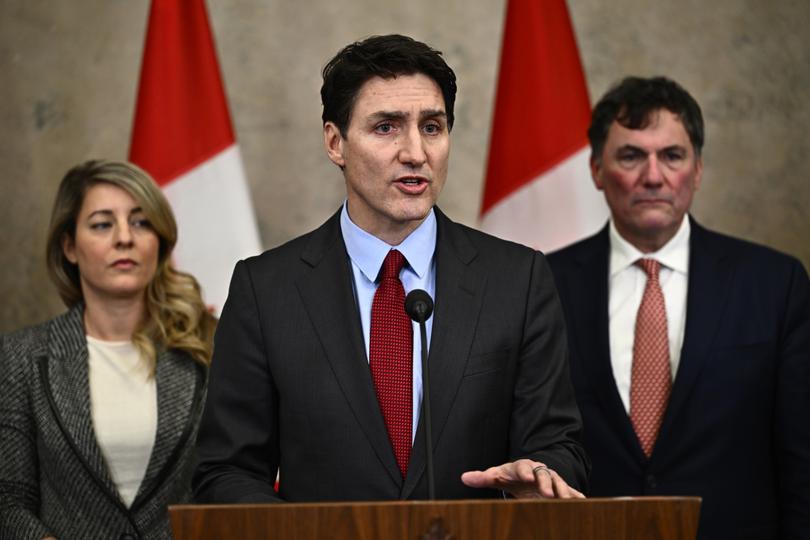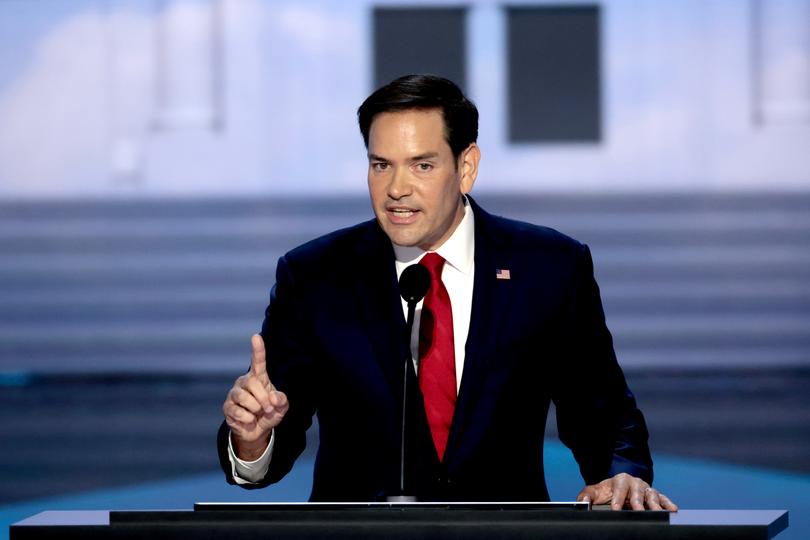LATIKA M BOURKE: Donald Trump must be wary of attacking allies with tariffs and forgetting power of pack

Donald Trump isn’t afraid to wield US power and junk international norms to shore up American supremacy.
But the US President, in attacking allies before his foes, risks undermining American greatness to China’s advantage.
Because so far, under America First Trump looks intent on countering Chinese dominance only when it threatens US interests rather than the global order. This threatens to weaken, if not fracture the already flimsy coalition of Western countries the US has long asked to help it contain the PRC’s aggression.
Sign up to The Nightly's newsletters.
Get the first look at the digital newspaper, curated daily stories and breaking headlines delivered to your inbox.
By continuing you agree to our Terms and Privacy Policy.Confronted by a rising China that depleted US manufacturing, and hollowed out regional jobs, communities, local identities and purpose, Trump is America’s delayed reflex to the injustice imposed on its working class by an elite hellbent on the idea that globalisation would be a net good.
Trump was correct to establish the fault line that he did on China during his first presidential run when he highlighted the unfairness of outsourcing jobs to a country that uses slave labour and does not play by the same rules when it comes to worker protections and State subsidies.
His successor Joe Biden was just as correct to reshore manufacturing in the next-generation industries of clean tech, electric vehicles and semi-conductors through huge industrial subsidies.
But Biden’s timidity in using US power to resolve the Ukraine war and settle the Middle East aided Trump’s rebound.
And so the advantage of re-electing Trump in 2024 was the effect his “madman” tactics or unpredictability could have on China’s President Xi Jinping, Russia’s Vladimir Putin and their authoritarian associates in Iran and North Korea.
But who expected Trump’s first round of fire would be aimed at fellow NATO allies Denmark and Canada as well as Mexico and Colombia whose Government was rapidly forced to obey its mighty neighbour after initially refusing two planeloads of deported migrants?
Who also anticipated that Trump would resurrect as a 19th-century imperialist, wanting to take over Greenland and repeatedly threatening to annex Canada?
So far, and it should be stressed, that it’s only three weeks into his second four-year term, Trump has shown himself to be far more eager to use the blunt force of American economic might against smaller, weaker friends, such as Canada and Mexico, which were hit with 25 per cent tariffs compared to America’s superpower rival China which got off lightly, with 10 per cent tariffs.
“I think Canadians are a little perplexed as to why our closest friends and neighbours are choosing to target us, instead of so many other challenging parts of the world,” Canada’s retiring Prime Minister Justin Trudeau said.
“I don’t think there’s a lot of Americans who wake up in the morning saying ‘damn Canada, we should really go after Canada.’’’
Canadians booed the playing of the US national anthem at sporting matches between Canadians and visiting American teams this weekend.
Trudeau said while the relationship was going through a difficult time right now Canada would always be there for the US.
But Trump Republicans should not be so confident that everyone will remain so loyal.
The world is in a critical moment and a state of intense contestation. Western Europe is struggling to keep its economy pumping and voters happy.
China’s Xi Jinping wants a world that does away with the current rules-based order that has been overseen by American and her allies post World War II.

And it seems the US agrees – Marco Rubio told his confirmation hearing to become Secretary of State that China has exploited and cheated that same order to its superpower status.
The cohort that endorsed Trump’s Golden Age vision is also fatigued by what it sees as America playing global cop, only to be used and abused by its allies, especially Europe which gorged on Russian gas and spent pitiful amounts on its defence relying on the US as its security insurer.
“We assumed this responsibility of sort of becoming the global government in many cases, trying to solve every problem,” US Rubio told Megyn Kelly last week.
“It’s not normal for the world to simply have a unipolar power.
“That was an anomaly, it was a product of the end of the Cold War, but eventually you were going to reach back to a point where you had a multipolar world, multi-great powers in different parts of the planet.
“We face that now with China and to some extent Russia, and then you have rogue states like Iran and North Korea you have to deal with.”
So the rules-based order has collapsed and what is different this time is that under Trump, the US is no longer trying to salvage it.
Instead, it is protecting itself and if allies get in the way of that, tough.
This is the law of the jungle and Trump and Xi are the apex predators. Where that leaves the rest of us is still being determined.
But the Trump Administration is showing dangerous signs of going on the hunt and forgetting the power of the pack.
The United States’ point of difference has always been its allies. But under Trump they can be dispensable.
Demonstrating to your friends that you are willing to behave just like their foe will place the frail but not insignificant coalition of Western countries trying to convince China to rise peacefully rather than aggressively under major stress.
“The United States needs to do what’s in the best interest of the United States,” Rubio also said in his interview last week.

“Where our interests align, that’s where you have partnerships and alliances; where our differences are not aligned, that is where the job of diplomacy is to prevent conflict while still furthering our national interests and understanding they’re going to further theirs.”
But the White House is naive to think the rest of the world, its partners and some allies won’t be recalibrating, particularly if they are whacked next with Trump’s tariff stick.
It’s worth remembering just how badly China’s wolf-warrior diplomacy and its economic coercion of Australia, using massive trade tariffs as punishment for former prime minister Scott Morrison’s call for an inquiry into COVID, reverberated around the globe and backfired on Beijing.
It turns out bullying and threatening countries into submission isn’t a great look for your international reputation.
This is why Trump’s methods are an enormous gamble, currently, they have yielded results. The Colombians accepted back their citizens. The Panamanian President said he is examining if Panama can terminate its Belt & Road agreement with China on the operation of the Canal early following Rubio’s weekend visit.
So this behaviour is likely to continue. But at what longer-term cost, particularly if it becomes evident that this is not just a Trump-specific approach but a new way the GOP approaches foreign policy?
If Trump is happy to trash alliances in the name of US dominance, but not for the preservation of global rules, standards and norms and protects them also, the offer between China and the US doesn’t start to look greatly different if you’re a government that doesn’t care about your citizens’ freedoms anyway.
The thin threads holding together Europe’s tougher stance on China will certainly break, and the French view, as articulated by President Emmanuel Macron, that the continent shouldn’t be dragged into a US-China rivalry over Taiwan will gather support, especially if Trump goes ahead with this threat to impose huge tariffs on the European Union.
Why shouldn’t Europe reconsider China as its economic partner if the US is also going to bully and subsidise to maintain dominance and simultaneously feed issues that matter to the EU like climate change, foreign aid and diversity to the bonfire?
And then there is the global south, non-aligned countries in the Pacific, Africa, Latin America and Asia that have always viewed American claims to be upholding democracy and social freedoms as either a threat or at the very least hypocritical.
Trump wants to restore American greatness with his radical modus operandi and agenda. But those in the Republican party who have a stake in what America looks like post-Trump, need to find a way to ensure that America First does not become its greatest weakness and a Trump card for China.
